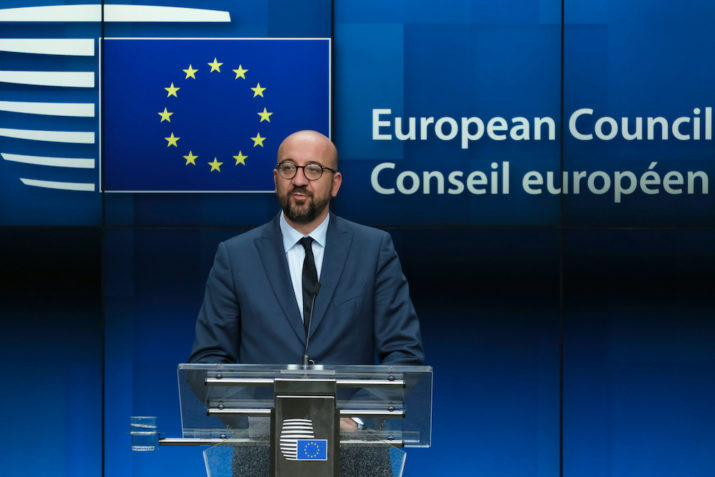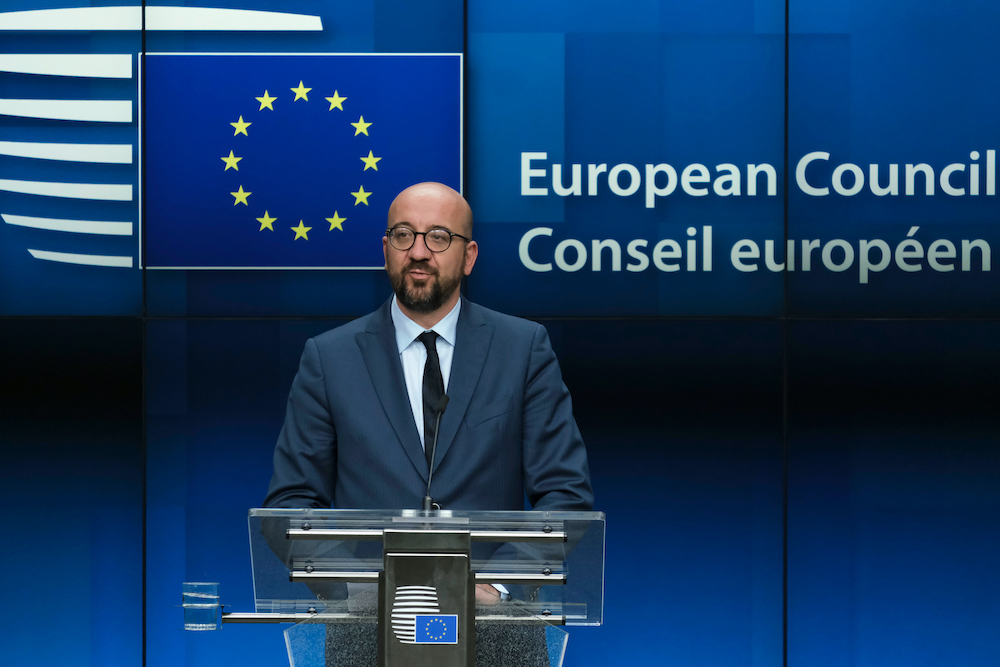

This is part of our special feature, Imagining, Thinking, and Teaching Europe.
This is part of our roundtable on European Integration.
The European Union (EU), the most successful sui generis international cooperation project, has built its present level of integration mainly on the mechanisms of the Economic and Monetary Union (EMU), which has developed constantly and successfully, although lacking the support of a fiscal union. The present time can be characterized as the right moment for reinforcing European integration, through appropriate and effective tax policy tools. The necessary resources to finance EU actions, and to ensure required funds for the proper functioning of European institutions and bodies, are vital for EU activities and for the development of its future projects. In the context of the present international and regional financial challenges, fiscal regulation demonstrates the EU’s abilities to extend and consolidate cooperation among member states. Based on evidence of the successful evolution of the European currency and on the lessons drawn from the most recent global financial crisis, some important steps have been taken towards deepening European integration through fiscal harmonization. The regulatory framework for fighting tax avoidance, aggressive taxation on corporations, and the taxation on revenues earned from online businesses are steps to support this argument.
The idea of harmonization of taxes in the EU is not new. The need for pertinent and uniform European taxation rules has emerged since the first treaties, when free movements of goods, persons, services, and capital became fundamental European values. In order to conduct EU activities and to achieve the goals stated in the institutive treaties, member states had to regulate their common financial resources. The evolution of the financial legal framework of the EU was marked by several important decisions and moments: unification of budgetary instruments, increase in financial autonomy, achievement of institutional balance, and the setting up of unique budgetary instruments. The EU enlargements of 2004 and 2007 had widened disparities in income levels between nationals of member states and put more pressure on this field of cooperation. This situation generated tough discussions within the EU. Controversies regarding fiscal and budgetary problems did not lack and have been amplified in the context of BREXIT, as proven by the difficulties in negotiations for concluding the Multiannual financial framework for 2021-2027.[1] The EU leaders conducted intense negotiations over the EU’s long-term budget for 2021-2027 during the special meeting of the European Council last February. The main issues at stake in the discussions were: the overall level of the EU budget; allocations for the main policy areas; financing, including revenues and possible corrections of the revenues; conditionality and incentives. After the Summit, the President of the European Council, Charles Michel, said that the participants had “worked very hard to try to reconcile the different concerns, the different interests, the different opinions on the table,” but that more time was still needed to reach consensus. This shows a lack of coordination in financial policy in general, and reflects cautiousness in overcoming taxation disparities.
The balance of the EU budget depends not only of an efficient spending policy, but equally on revenue collection. On one hand, the member states’ overwhelming will to cooperate and to support the overall EU activities, as autonomous legal person is decisive for the development of fiscal cooperation. On the other hand, the determination of governments to conserve their fiscal sovereignty proved to be obstructive. It is notable that the field of EU regulation for harmonizing taxes remains one of the few areas where adoption of new rules requires the unanimous affirmative vote from each one of the member states. Art. 115 of the Treaty on the Functioning of the European Union, (ex Article 94 TEC) states:
[The] council shall, acting unanimously in accordance with a special legislative procedure and after consulting the European Parliament and the Economic and Social Committee, issue directives for the approximation of such laws, regulations or administrative provisions of the Member States as directly affect the establishment or functioning of the internal market.[2]
The EU member states still hold on to and value their traditional right to decide on tax policy. It is a tool that they do not want to put in others’ hand, although they agree that deepening the EU integration process eventually should include harmonization in this area of action. For the time being, there are twenty-seven tax systems within EU boarders and the principle of administrative decentralization determines that each existing territorial administrative unit in the EU states has its local tax regulation, which fragments the European taxation area twenty-seven more times.
The financial crisis that took place during the first decade of this century pointed out that further financial mechanisms are necessary to emphasize the integration process of cooperation among EU member states. Transparency in the use of public funds, governments’ fiscal responsibility, and corporate social responsibility evolved from academic research groups’ milestones topics to the status of mandatory rules incorporated in uniform legislation. New institutions were designed and set up, proving the common will of EU member states to improve monitoring and control of the allocation of public funds. Member states have strengthened the surveillance of the spending of the funds coming from the European budget and they have created the competence to proceed to sanctions in the event of a violation of EU financial regulation.
The process of reinforcing EU financial integration is self-sustainable and is developing steadily toward levels that seemed rather impossible to reach some time ago. The institutional framework of the EU is widening, adding a new high-level public servant: the European prosecutor. This institution is intended to bring effectiveness and precise practical results in the fight to improve EU spending policy implementation. The person currently appointed to this position is the Romanian ex-chief of the National Anticorruption Department. She will be responsible for investigating cases in connection with fraud and for coordinating criminal procedures pertaining to EU funds. It is estimated that the European prosecutor’s activity will generate positive effects on the implementation of the EU budget, although about one quarter of the member states have not joined this project yet and they are welcome to do so whenever they consider it appropriate.
The status of the cooperation in taxation area needs to improve globally, as well as at EU level. The legal framework for fighting tax avoidance practices needs to take into consideration the international context, dominated by the Organization for Economic Cooperation and Development (OECD) actions and oriented by the US 2017 changes in taxation. Meanwhile, EU institutions have put great effort at identifying the most efficient methods to fight tax avoidance, in general, and to limit aggressive tax planning, in particular. In October 2016, the European Commission proposed to re-launch the Common Consolidated Corporate Tax Base. In March 2018, the European Commission proposed new rules to ensure that digital business activities are taxed in a fair and growth-friendly way in the EU[3]. Corporate taxation is a topic of intensive research, scholars and practitioners looking for the appropriate rules of law to limit and, possibly, to eliminate tax avoidance by companies that operate internationally. Weaknesses in the current domestic rules create opportunities for lowering the revenues that are subject to taxation (this strategy is called base erosion) and for moving the profits from one company subject to high taxation to another company in the same corporate group that is located in a territory with lower level of taxation (this is called profit shifting). Aggressive corporate tax planning determines the need to restore the confidence in the way public budgets are managed, improving control on the procedure to spend public funds and making more efficient the collection of legitimate revenues. The sovereignty of the states to rule taxation has generated a wide diversity of taxation systems. Every multinational business is challenged to optimize its fiscal liabilities, either diminishing taxation base (base erosion) or moving the income to another jurisdiction (profit shifting). The dimension of the tax avoidance using Base Erosion and Profit Shifting (BEPS) requires courageous measures by policy makers to ensure that profits are taxed where economic activities take place and value is created, according to the fundamental principle of site taxation. The EU legislative institutions (European Parliament and Council of the European Union) manage the adoption procedure for the bold directives ruling common consolidated corporate tax (CCCTB), a project that goes further than the OCDE BEPS soft law in harmonizing international taxation.
The issue of splitting profits among different fiscal jurisdictions is even more challenging in today’s digital economy, because the place where the profits are generated is arguable. The OECD is currently working on formulating an international solution for the taxation from digital activity. There is not one single definition for digital business/digital services. To identify common features of this type of activity, we must first consider that it is based on internet use. Second, there are many controversies about digital services: the scope of such economic activity, how to overcome the difficulties in estimating/measuring the revenues it generates, how to increase the scope of definition, without excluding any taxable activities. Third, this is a global issue member states must agree on since some countries have recently taken unilateral measures to implement taxation on digital services (Austria, Belgium, Czech Republic, France, Italy, Norway, Poland, Slovenia, Spain, Turkey, and the United Kingdom).
The legal framework for the activities in digital economy and its specific taxation system evolved at EU level, where a proposal to tax revenues from digital activities of multinational corporations was launched in 2018. Up to now, the EU member states have not reached an agreement on the proposed regulation, because the rule of unanimity vote for fiscal regulation causes lengthy procedures for the adoption of every new piece of EU regulation. Still, the fact that several countries have announced, proposed, or even implemented such a tax in their domestic legal framework proves that there is a strong understanding of the necessity of such regulation. If the common substantive law is delayed, the need to have it effectuated uniformly will eventually emerge. In late autumn 2019, France adopted the digital services tax (DST) which generated intense discussion among IT users and for those generating profits from on-line activities.[4]
The current level of EU integration clearly shows that the process of fiscal reconciliation does not seem to be spontaneous. and it was designed at prudent moderate speed. Fiscal harmonization within EU has evolved to a certain necessary but not sufficient level, but it is time to enhance and upgrade it to a higher level of coordination between EU Member States’ domestic tax policies. When differences in taxation are interpreted and used for aggressive tax planning―favoring tax avoidance―a series of actions aimed at reducing existing disparities among regions or states should be adopted. This is difficult (even impossible) in the current fiscal sovereignty framework and it demands governments’ adequate will to coordinate their fiscal policy―a path leading to a fiscal union. Still, tax harmonization within EU is justified and opportune in the present international and regional context. Potential tax differences between EU neighboring areas located in different states distort the function of the single European market. This is why necessary measures are needed to integrate domestic fiscal policies within the framework of the single market. Bold action should be taken to limit the fiscal sovereignty of the EU member states and move the tax harmonization process to a higher effectiveness level.
Mihaela Tofan is a researcher and professor of law, as well as Jean Monnet Chair for European Financial Regulation, Fulbright Senior Scholar. In Fall of 2019, she was an Emile Noel Fellow at NYU School of Law.
References:
[1] https://www.consilium.europa.eu/en/policies/eu-budgetary-system/multiannual-financial-framework/mff-negotiations/, retrieved on the 3rd of March 2020.
[2] https://eur-lex.europa.eu/legal-content/EN/TXT/PDF/?uri=CELEX:12012E/TXT&from=EN, retrieved on the 3rd of March 2020.
[3] https://ec.europa.eu/taxation_customs/business/company-tax_en, retrieved on the 3rd of March 2020
[4] https://ustr.gov/sites/default/files/Report_On_France%27s_Digital_Services_Tax.pdf, retrieved on the 3rd of March 2020.
Photo: Belgium’s Prime Minister Charles Michel gives a press conference after the EU leaders struck a deal on the bloc’s top jobs during the third day of a EU summit, in Brussels on July 2, 2019.
Published on June 3, 2020.




